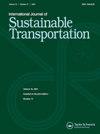Evaluation aspects of active transport system: A review and way forward in the context of developing countries
IF 3.9
3区 工程技术
Q2 ENVIRONMENTAL STUDIES
International Journal of Sustainable Transportation
Pub Date : 2025-05-04
DOI:10.1080/15568318.2025.2500559
引用次数: 0
Abstract
Active transport, namely walk, bicycle and manual tricycle, are in use for trips of varied lengths in developing countries like India. Considering their importance in social and economic sector, it is essential to have the associated infrastructure in place. Along with that it is necessary to assess the usability and acceptability of the infrastructure periodically. A systematic review of relevant 116 articles highlighted that the available tools are contextual, do not address dynamic changes and the choice of attributes is narrow but focused. Based on the research gaps being identified, this study aims to develop a framework for a comprehensive and generalized evaluation of active transport systems in developing countries. The dimensions like availability of associated infrastructure, utilities, safety concerns, and policy interventions are integrated in the proposed framework which includes the quantitative and qualitative information related to different aspects and dimensions. The framework consists of indices such as Active Mobility Facility Index (AMFI) and the Perceived Service Quality Index (PSQI) which requires primary (user perception surveys) as well as secondary data (road inventory surveys). The proposed Composite Active Sustainability Index (CASI) is expected to serve as a valuable decision-making tool for planners and policymakers and will enable them in prioritizing and implementing relevant infrastructure, and policies related to environmental, social, and economic dimensions.
主动运输系统的评价方面:发展中国家背景下的审查和前进方向
在印度等发展中国家,人们使用步行、自行车和手动三轮车等主动交通工具进行不同长度的旅行。考虑到它们在社会和经济部门的重要性,有必要建立相关的基础设施。除此之外,还需要定期评估基础设施的可用性和可接受性。对116篇相关文章的系统回顾强调,可用的工具是上下文相关的,不处理动态变化,属性的选择范围狭窄但重点突出。根据正在确定的研究差距,本研究旨在制定一个框架,对发展中国家的主动运输系统进行全面和普遍的评价。相关基础设施的可用性、公用事业、安全问题和政策干预等维度被整合到拟议的框架中,该框架包括与不同方面和维度相关的定量和定性信息。该框架由诸如主动移动设施指数(AMFI)和感知服务质量指数(PSQI)等指数组成,这些指数需要主要(用户感知调查)以及次要数据(道路清单调查)。拟议的综合主动可持续发展指数(CASI)有望成为规划者和决策者的宝贵决策工具,使他们能够优先考虑和实施相关的基础设施,以及与环境、社会和经济层面相关的政策。
本文章由计算机程序翻译,如有差异,请以英文原文为准。
求助全文
约1分钟内获得全文
求助全文
来源期刊
CiteScore
8.90
自引率
2.60%
发文量
56
期刊介绍:
The International Journal of Sustainable Transportation provides a discussion forum for the exchange of new and innovative ideas on sustainable transportation research in the context of environmental, economical, social, and engineering aspects, as well as current and future interactions of transportation systems and other urban subsystems. The scope includes the examination of overall sustainability of any transportation system, including its infrastructure, vehicle, operation, and maintenance; the integration of social science disciplines, engineering, and information technology with transportation; the understanding of the comparative aspects of different transportation systems from a global perspective; qualitative and quantitative transportation studies; and case studies, surveys, and expository papers in an international or local context. Equal emphasis is placed on the problems of sustainable transportation that are associated with passenger and freight transportation modes in both industrialized and non-industrialized areas. All submitted manuscripts are subject to initial evaluation by the Editors and, if found suitable for further consideration, to peer review by independent, anonymous expert reviewers. All peer review is single-blind. Submissions are made online via ScholarOne Manuscripts.

 求助内容:
求助内容: 应助结果提醒方式:
应助结果提醒方式:


